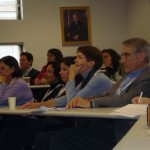The Problems with Disclosure
We had a wonderful edition of “On the Issues” with Mike Gousha last week with my former partner, Mike Grebe, now CEO of the Bradley Foundation. Mike is a great guy who has had a wonderful career. Bradley is a generous supporter of the law school and has been a tremendous force for good in the community and nationally. (By way of full disclosure, Bradley funds the Wisconsin Policy Research Institute and I have a relationship with them.)
I could go on about Mike, but I’d rather disagree with him. In response to a question of the audience, he criticized the McCain-Feingold Act and other efforts to wring money out of politics.
I agree with that.
But Mike went on to say that he believes that the answer to concerns about undue influence is mandatory disclosure. We should all know who has given what to whom.
I used to believe that.
Now I’m not so sure.


